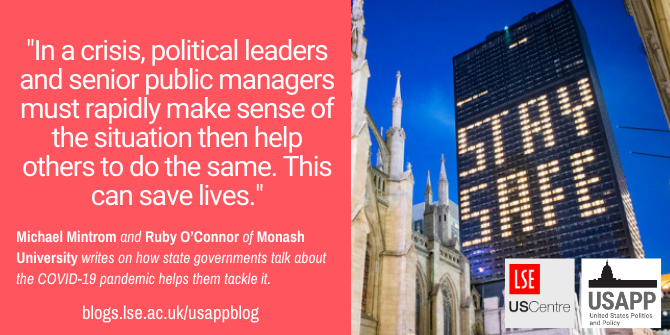 Much of the responsibility for tackling the COVID-19 pandemic in the US has fallen on states and their governments. Michael Mintrom and Ruby O’Connor write that the stories governors have told their citizens about their state’s COVID-19 policies have been incredibly important. They argue that in order to best aid the acceptance of often controversial policies, policymakers should strive to create consistent messages, crafted to local conditions and that align talk with action.
Much of the responsibility for tackling the COVID-19 pandemic in the US has fallen on states and their governments. Michael Mintrom and Ruby O’Connor write that the stories governors have told their citizens about their state’s COVID-19 policies have been incredibly important. They argue that in order to best aid the acceptance of often controversial policies, policymakers should strive to create consistent messages, crafted to local conditions and that align talk with action.
COVID-19 has posed big challenges to governments everywhere. The successes and failures of government responses offer lessons both as we continue to address the pandemic and as we prepare for future crises. In recent research, we analyzed the COVID-19 policy narratives of the governors of California, Florida, New York, and Texas. These narratives have influenced the effectiveness of the state responses to COVID-19.
Sometimes, policies don’t align with current social norms or desires. That’s certainly been the case with responses to COVID-19. In policymaking, narratives are stories constructed to persuade key constituents to support specific policies – even if those policies are not immediately appealing.
Nobody enjoys their freedoms being curtailed. But with the COVID-19 crisis, we’ve seen people being persuaded to give up some freedoms temporarily to limit the spread of the virus. The key has been for people to see that temporarily giving up some freedoms will lead to better future outcomes, both for themselves and for the broader society.
In a crisis, political leaders and senior public managers must rapidly make sense of the situation then help others to do the same. This can save lives.
Policy Narratives can support crisis responses
Policy narratives created to support effective crisis responses can have four effects.
First, policy narratives can provide persuasive accounts of what is happening, why it is happening, and what should be done about it. In California, Democratic Governor Gavin Newsom created a persuasive account early on. He did this by engaging with his audience while implementing policies that consistently aligned with his message of working collectively to control the spread of the virus and mitigate its health impacts.

“Lotte New York Palace Displays Stay Safe During COVID19 Quarantine New York City” by Anthony Quintano is licensed under CC BY 2.0
Second, policy narratives can create a broad coalition of support for policy actions to be taken, reducing opportunities for conflict. Democratic New York Governor Andrew Cuomo’s daily briefings saw him serve as a unifying and trusted voice for the nation. Emphasizing unity over division and focusing on the need for neighboring states to work together, Cuomo created a policy narrative that enabled him to traverse state and ideological boundaries.
Third, policy narratives can nurture trust and cooperation among those whose actions will be material to addressing a crisis. Newsom and Cuomo emphasized that the crisis could be managed so long as everyone followed the policies being implemented to save lives. In Florida, Republican Governor Ron DeSantis developed a counter-narrative. DeSantis posited that citizens would not be able to comply with too strict measures. Further undermining the need for Floridians to work together, he continued to claim that things were generally going well in Florida – even as case numbers were rising.
Fourth, policy narratives can enable people to make informed responses to a crisis within their respective localities. In Texas, Republican Governor Greg Abbott played down the health repercussions of the virus and insisted that avoiding losses to business was the driving factor behind his decisions. By privileging the right to reopen businesses, Governor Abbott suggested to his citizens that a rapid transition back to the status quo was necessary, appropriate, and possible.
Throughout the crisis, political leaders have been mindful of protecting population health and maintaining economic performance. All have found it greatly challenging to pursue both goals simultaneously. The call to save lives can quickly clash with economic boosterism. This has meant that we’ve seen some confusing and seemingly inconsistent statements from political leaders, even as they have tried to do their best for their constituents.
Lessons from assessing policy narratives
From assessing the policy narratives of the four governors, we draw three lessons:
- Consistent messaging is important. A narrative that has a consistent, overarching message about how and why a policy or set of policies is being implemented helps people appreciate why changes are occurring and determine how they – and their actions – can support them.
- The message needs to be crafted to the local context. To be effective, policies need to be accepted within the local context where they are being implemented. The narrative around these policies must appeal to, and resonate with, a variety of people.
- Talk must be aligned with action. No matter how compelling a narrative and how engaging its delivery, if the implemented policies contradict it, then public trust and cooperation will wane. The narratives that accompany policy implementation must accurately explain the policy decision. Actions and impacts must support the narrative.
We’ve drawn these lessons from analyzing how four state governors responded to the COVID-19 crisis. They can apply in other policymaking contexts too. In sum, policymakers should strive to create consistent messages, crafted to local conditions, that align talk with action. Policy narratives do not necessarily have life and death impacts. But – as this crisis has reminded us – sometimes they do.
- This article is based on the paper, ‘The importance of policy narrative: effective government responses to Covid-19’ in Policy Design and Practice
Please read our comments policy before commenting.
Note: This article gives the views of the author, and not the position of USAPP– American Politics and Policy, nor of the London School of Economics.
Shortened URL for this post: https://bit.ly/2G0KAug
About the authors
 Michael Mintrom – Monash University
Michael Mintrom – Monash University
Michael Mintrom is a Professor of Public Policy and Director of Better Governance and Policy at Monash University.
Ruby O’Connor – Monash University
Ruby O’Connor is a Research and Administration Officer with Better Governance and Policy at Monash University.



